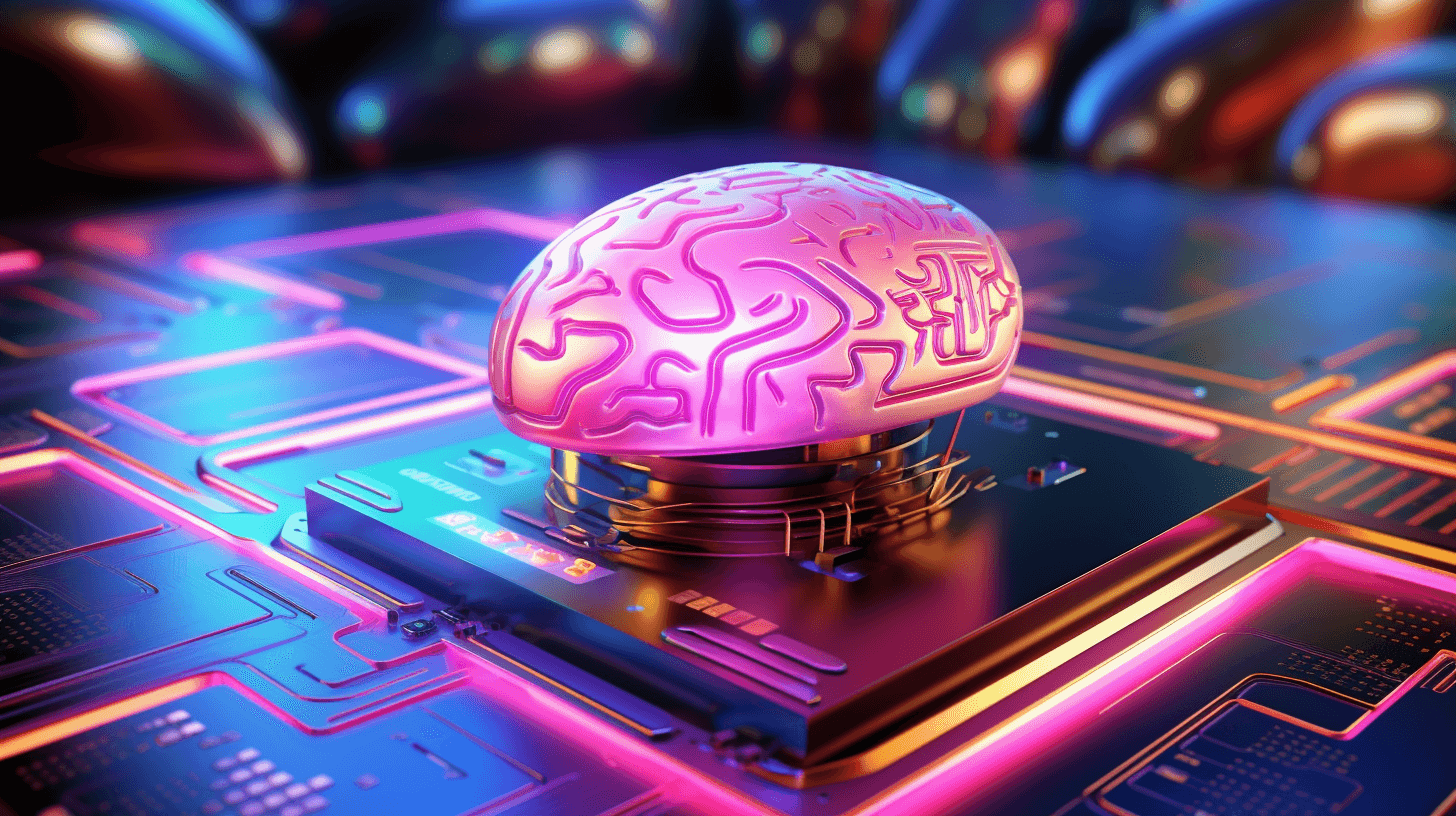🤖💎 Big Kine Showdown Fo’ A.I.: Meta Give Away All Da Kine Valuables Fo’ Free
Eh, you know wat wen happen? Da tech big boy Meta wen make public da kine latest A.I. technology fo’ make peeps build their own kine chatbots. But da oda guys, like Google, dem stay tell dat da kine move stay kind dangerous.
In da month of February, Meta wen pull one big kine move in da world of artificial intelligence weh we stay see change real fast. Dey wen decide fo’ make da A.I. big kine kuleana, jus’ give um away. Da Silicon Valley heavy hitter, weh own Facebook, Instagram, and WhatsApp, wen come up wit one A.I. technology, called LLaMA, fo’ run da kine online chatbots. But, insteada keeping da technology all to demself, Meta wen send da computer code of da system out into da wild. 👩💻🔓
Any kine academics, government researchers, and odda guys weh give their email address to Meta could download da code once da company check out da person. In da big picture, Meta was just giving away their A.I. technology as open-source software – da kine computer code weh can be copied, changed, and used again – giving da outsiders everyting they need fo’ make chatbots fast kine.
“Da platform weh going win going be da open one,” said Yann LeCun, da big A.I. scientist of Meta.
As da race fo’ lead A.I. heat up across Silicon Valley, Meta stay make demself stand out from da rivals by take different approach to da technology. 🏁🔥 Pushed by da founder and CEO, Mark Zuckerberg, Meta believe da smartest ting to do is share their A.I. engines as one way fo’ spread influence and ultimately move faster toward da future.
Da kine actions stand out from Google and OpenAI, two companies leading da new A.I. arms race. Dem worried dat A.I. tools like chatbots going be used fo’ spread disinformation, hate speech and oda kine toxic content, so dey becoming more secretive about da methods and software dat stay underpin their A.I. products. 🤫💻
Google, OpenAI and odda guys been critical of Meta, saying da open-source approach wit no restrictions is one kine dangerous. Da fast kine rise of A.I. in recent months wen ring alarm bells about da risks of da technology, including how it could shake up da job market if not deployed right. And within days of LLaMA’s release, da system wen leak onto 4chan, da online message board known fo’ spread false and misleading information. 🚨📲
“Us like think more carefully about giving away details or open sourcing code of A.I. technology,” said Zoubin Ghahramani, one Google vice president of research who helps oversee A.I. work. “Wea can dat lead to misuse?”
Some inside Google also been wonder if open-sourcing A.I. technology may pose one competitive threat. In one memo dis month, which wen leak on da online publication Semianalysis.com, one Google engineer wen warn colleagues dat da rise of open-source software like LLaMA could cause Google and OpenAI fo’ lose their lead in A.I. 📝📊
But Meta said dey no see any reason fo’ keep da code to demself. Da growing secrecy at Google and OpenAI is a “huge mistake,” Dr. LeCun said, and a “really bad take on wat is happening.” He argue dat consumers and governments no going accept A.I. unless it is outside da control of companies like Google and Meta.
“You like every A.I. system to be under da control of one couple of powerful American companies?” he asked.
OpenAI wen decline fo’ comment.
Meta’s open-source approach to A.I. not something new. Da history of technology stay full with fights between open source and proprietary, or closed, systems. Some hoard da most important tools weh used fo’ build tomorrow’s computing platforms, while others give those tools away. Most recently, Google open-sourced the Android mobile operating system to take on Apple’s dominance in smartphones. 🍏🤖
Plenty companies been openly share their A.I. technologies in da past, at the insistence of researchers. But their tactics stay change because of da race around A.I. Dat shift began last year when OpenAI released ChatGPT. Da chatbot’s wild success wowed consumers and kicked up the competition in the A.I. field, with Google moving quickly to incorporate more A.I. into its products and Microsoft investing $13 billion in OpenAI.
While Google, Microsoft and OpenAI have since received most of the attention in A.I., Meta also been invest in the technology fo’ nearly a decade. The company spent billions of dollars building the software and the hardware needed to realize chatbots and odda “generative A.I.”, which produce text, images and odda media on their own. 💵🛠️
In recent months, Meta been work furiously behind da scenes to weave its years of A.I. research and development into new products. Mr. Zuckerberg stay focus on making da company one A.I. leader, holding weekly meetings on the topic wit his executive team and product leaders.
On Thursday, as one sign of its commitment to A.I., Meta said it had designed a new computer chip and improved a new supercomputer specifically fo’ building A.I. technologies. It also designing a new computer data center with an eye toward the creation of A.I. 👀🧠
“We’ve been building advanced infrastructure for A.I. for years now, and dis work reflects long-term efforts that will enable even more advances and better use of dis technology across everything we do,” Mr. Zuckerberg said.
Meta’s biggest A.I. move in recent months was releasing LLaMA, which is wat is known as a large language model, or L.L.M. (LLaMA stands for “Large Language Model Meta AI.”) L.L.M.s are systems that learn skills by analyzing vast amounts of text, including books, Wikipedia articles and chat logs. ChatGPT and Google’s Bard chatbot are also built atop such systems.
L.L.M.s pinpoint patterns in the text they analyze and learn to generate text of their own, including term papers, blog posts, poetry and computer code. They can even carry on complex conversations.
In February, Meta openly released LLaMA, allowing academics, government researchers and oddas who provided their email address to download da code and use it to build a chatbot of their own.
But da company went further than many odda open-source A.I. projects. It allowed peeps to download a version of LLaMA after it had been trained on enormous amounts of digital text culled from da internet. Researchers call this “releasing da weights,” referring to da particular mathematical values learned by da system as it analyzes data. 🌐🏋️♀️
Dis was significant because analyzing all dat data typically requires hundreds of specialized computer chips and tens of millions of dollars, resources most companies do not have. Those who have da weights can deploy da software quickly, easily and cheaply, spending a fraction of wat it would otherwise cost to create such powerful software.
As a result, plenty in da tech industry believed Meta had set a dangerous precedent. And within days, somebody released the LLaMA weights onto 4chan.
At Stanford University, researchers used Meta’s new technology to build their own A.I. system, which was made available on da internet. A Stanford researcher named Moussa Doumbouya soon used it to generate problematic text, according to screenshots seen by The New York Times. In one instance, the system provided instructions for disposing of a dead body without being caught. It also generated racist material, including comments that supported the views of Adolf Hitler.
In a private chat among da researchers, which was seen by The Times, Mr. Doumbouya said distributing da technology to da public would be like “a grenade available to everyone in a grocery store.” He no respond to a request for comment.
Stanford promptly removed the A.I. system from da internet. The project was designed to provide researchers with technology that “captured the behaviors of cutting-edge A.I. models,” said Tatsunori Hashimoto, da Stanford professor who led the project. “We took the demo down as we became increasingly concerned about misuse potential beyond a research setting.”
Dr. LeCun argue dat this kine of technology not as dangerous as it might seem. He said small numbers of individuals could already generate and spread disinformation and hate speech. He added that toxic material could be tightly restricted by social networks such as Facebook. 🤝🌐🚫
“You no can prevent peeps from creating nonsense or dangerous information or whatever,” he said. “But you can stop it from being disseminated.”
For Meta, more peeps using open-source software can also level da playing field as it competes with OpenAI, Microsoft and Google. If every software developer in the world builds programs using Meta’s tools, it could help entrench da company for the next wave of innovation, staving off potential irrelevance.🌊💡🏄♀️
Dr. LeCun also pointed to recent history fo’ explain why Meta was committed to open-sourcing A.I. technology. He said the evolution of da consumer internet was da result of open, communal standards dat helped build da fastest, most widespread knowledge-sharing network da world had ever seen.
“Progress is faster when it is open,” he said. “You have a more vibrant ecosystem where everyone can contribute.” 🚀🌍🤝
NOW IN ENGLISH
🏆🤖 Tech Giant Meta Battles in AI Arena, Decides to Give Away Its Treasure Trove
Meta, the tech behemoth owning Facebook, Instagram, and WhatsApp, made an unconventional move in the fast-changing world of artificial intelligence (AI) in February. It decided to give away its AI treasures. 🎁🔓
The Silicon Valley heavyweight had developed an AI technology, named LLaMA, which can power online chatbots. Instead of hoarding the technology, Meta decided to throw open the system’s underlying computer code for anyone interested. Scholars, government researchers, and anyone else who shared their email address with Meta could download the code once Meta had assessed the individual. 📚🔬💻
In essence, Meta was gifting its AI technology as open-source software – a code that can be freely copied, modified, and reused – offering outsiders everything they needed to quickly build their own chatbots. 🎁🔄💬
“The platform that will win will be the open one,” said Yann LeCun, Meta’s Chief AI Scientist. 🏁👑
As the competition to lead AI intensifies across Silicon Valley, Meta distinguishes itself from its rivals by adopting a different approach to the technology. Led by its founder and CEO, Mark Zuckerberg, Meta believes that the smartest strategy is to share its underlying AI mechanisms to expand its influence and, ultimately, accelerate towards the future. 🚀⏩
Its actions starkly contrast with those of Google and OpenAI, the two frontrunners in the new AI arms race. Concerned that AI tools like chatbots will be misused to propagate disinformation, hate speech, and other harmful content, these companies are growing increasingly secretive about the methods and software that drive their AI products. 🤐🔐
Google, OpenAI, and others have criticized Meta, stating that an unrestrained open-source approach can be perilous. AI’s swift ascent in recent times has rung alarm bells about the technology’s risks, including its potential to disrupt the job market if not managed appropriately. And within days of LLaMA’s release, the system leaked onto 4chan, an online message board notorious for spreading false and misleading information. 🚨💼🕵️♀️
Meta insists that there’s no reason to keep its code under wraps. The growing secrecy at Google and OpenAI is a “huge mistake,” according to Dr. LeCun, and a “very misguided perspective on what’s happening.” He contends that consumers and governments will refuse to embrace AI unless it’s beyond the control of companies like Google and Meta. 🤝🌐🚫
In Meta’s view, the more people use open-source software, the more level the playing field becomes as it competes with OpenAI, Microsoft, and Google. If every software developer globally builds programs using Meta’s tools, it could help solidify the company’s position for the next wave of innovation, staving off potential irrelevance. 🌊💡🏄♀️
Dr. LeCun also referred to recent history to justify Meta’s commitment to open-sourcing AI technology. He suggested that the evolution of the consumer internet was the result of open, communal standards that helped construct the fastest, most widespread knowledge-sharing network the world has ever seen.
“Progress is faster when it is open,” he said. “You have a more vibrant ecosystem where everyone can contribute.” 🚀🌍🤝






